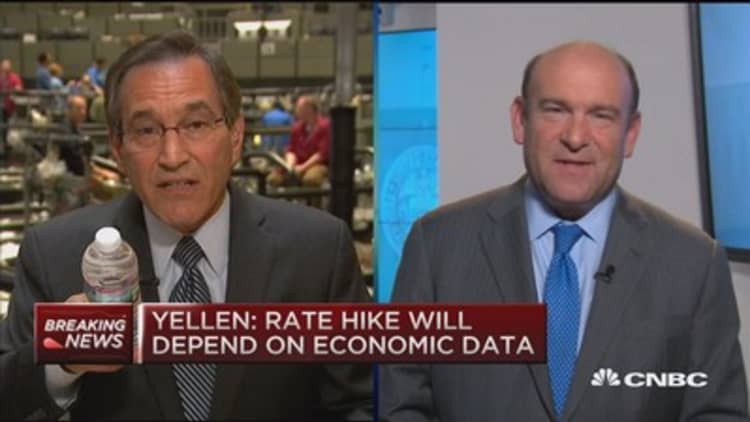
Has the U.S. Federal Reserve become the world's economic guardian? The central bank's decision not to lift interest rates this week because of weakening global growth and a recent surge in market volatility has sparked talk of a "third mandate."
Analysts say that explicit references by the Fed following its meeting on Thursday to the China slowdown and its impact mark a significant departure for the central bank, which is mandated to ensure job creation and price stability in the U.S. economy.
"The Federal Reserve's third mandate appears to be global financial stability," Mark Haefele, global chief investment officer at UBS Wealth Management, said in a note.
"The U.S. central bank has backed away from its first rate rise in over nine years, saying that international economic and financial weakness could dampen activity in the U.S.," he said.
Economists had been split over whether the Fed would deliver a long-anticipated rate increase this week and market expectations for when rates will rise have been pushed back further following a dovish Fed statement.
In fact, one reason for the scaling back of rate-hike speculation in recent weeks has been growing concern about weakness in China – the world's second-largest economy after the U.S. – and a sharp sell-off in emerging and developed markets in August.
According to Deutsche Bank, global stock markets lost $5 trillion of their value in six days in August.
"The argument that global market developments are playing second fiddle to U.S. economic developments is a tenuous one, especially if the epicentre of global economic weakness is China – which is very important to U.S. economy," Nicholas Spiro, managing director of Spiro Sovereign Strategy, told CNBC.
"It's clear that what's happening in China, especially in recent months, is having a massive deflationary impact so it's about time we heard the Fed was concerned about China," he said.
Beijing is targeting a full-year growth rate of around 7 percent, which would be the slowest rate in almost 25 years. And there are concerns that the target will be missed amid weak economic data and a rout in Chinese stock markets that threaten to undermine confidence further.
Weakness in China's economy, which has helped drive global growth for decades, has far reaching ramifications – commodity prices and emerging markets for instance have all been hit hard by China's woes.
"It's not so much the volatility in markets but the volatility in markets that reflects concerns about China and oil prices that have been a big mover and shaker in the past 18 months," Francesco Garzarelli, co-head of European Macro at Goldman Sachs, told CNBC on Friday, talking about whether the Fed has taken on a third mandate.
"So to the extent that China and oil tell us about global economic conditions and where monetary policy elsewhere is going to go, I think it's legitimate for them (Fed policymakers) to bring that on board," he said.



